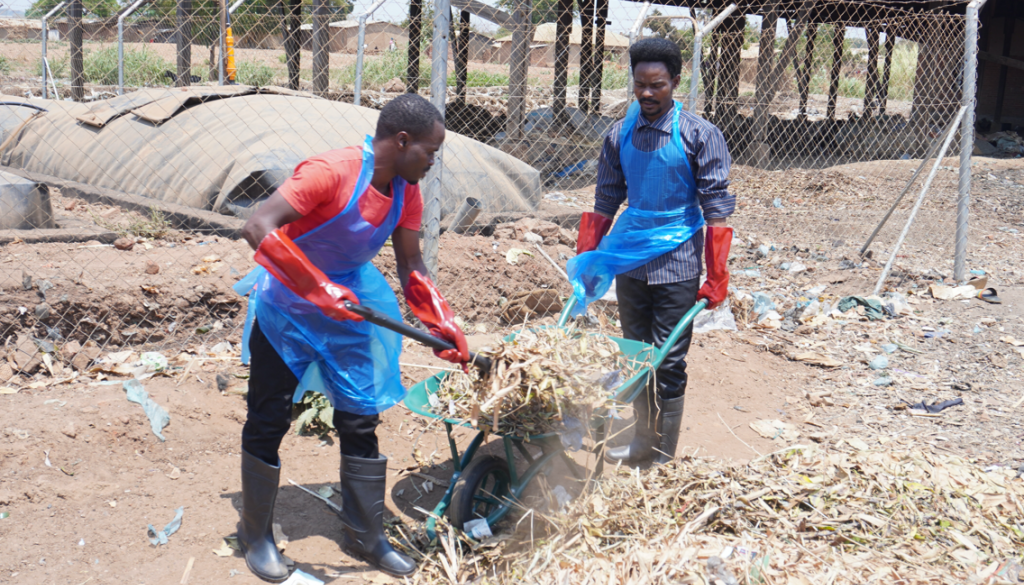Increasing Access to Waste Management Services in Informal Settlements in Lilongwe City, Malawi
In this blog from Zilire Luka, Bernard Kondowe, Jiban Karki and Hayley Stewart we learn more about the project to increase access to waste management services in informal settlements in Lilongwe, the capital city of Malawi. This work is being undertaken by our partners in Malawi, the Centre for Community Organisation and Development (CCODE) and its alliance partner, the Federation of the Rural and Urban Poor (the Federation), part of SDI. It is funded by the ARISE Responsive Fund.
The problem
The local authority, Lilongwe City Council (LCC), faces several constraints, some of which are related to availability of resources, which makes it difficult to collect all solid waste. As a result, the local authorities tend to concentrate their waste collection activities in so-called ‘formal’ areas, neglecting informal settlements. Currently the council lack sufficient data on how much it costs to collect and properly dispose of a ton of solid waste, though they estimate collection and delivery to the dumpsite costs between MK 3,000 and MK 5,300 per ton.
High urbanisation rates continue to contribute to the growth of informal settlements, with annual growth levels at 5.2% is very high compared to the national growth rate of 2.8% per year. As such, the national urbanisation level of 15.3% is expected to rise to 30% by 2030 and 50% by 2050. The LCC collects 30% of waste per day, in markets and low-density areas, however there are no waste collection services in informal settlements. The wanton disposal of household solid waste exposes peri-urban dwellers to an unhealthy environment, causing groundwater and air pollution, flooding through clogging water drainage systems and water borne disease, for example, cholera. The waste for wealth (W4W) concept is also not fully utilised by informal settlements. The W4W approach mobilises and trains community waste entrepreneurs to process waste into various products i.e., compost manure. These community waste entrepreneurs collect garbage from households and markets, sorting it and process it at the established community waste transfer centres.
ARISE outcomes
The work carried out in Malawi addresses a number of ARISE outcomes. Through this project local urban marginalised people will be better able to come together to identify their priorities around health and wellbeing and develop action to achieve their goals. It will lead to increased accountability and responsiveness from local government and other actors to meet the priorities of urban marginalised people, as well as helping urban marginalised people, government departments, other (development/community) organisations and researchers better understand what might improve the health and wellbeing of urban marginalised people.
The project will address the complexities in the waste management value chain (includes all aspects of the waste chain – from before a resource becomes ‘waste’ until the resource is brought back into a new life cycle) in informal settlements, while improving waste management in the targeted informal settlements through the adoption of the three Rs – Reduce, Reuse, Recycle.
Through the interventions we will create a critical mass of organised informal settlements working together to improve their wellbeing through improved waste management, while increasing local accountability and responsiveness to meet the priorities of organised informal settlements in the city. In order to undertake this action, the Malawi team identified study sites in Kaliyeka, Mgona, Mtandire.
Activities to date
So far, the project has collected, organised and disseminated data on waste generation and management for three informal settlements, the highlight of which being the waste audit process. The project has also supported the establishment of waste collection services in two informal settlements – Kaliyeka and Mtandire, which in turn created employment among young people. With the help of local communities, the project has produced different learning and knowledge management materials (including pamphlets, brochures, and short video clips to disseminate information on proper waste management practices in an informal settlement setting), promoting easy access to information, fostering collaboration between community members and Lilongwe City Council and enhancing decision making efficiency. The team also facilitated the capacity development of 130 community informal waste entrepreneurs in waste handling and processing (collection, sorting, composting and recycling).
Lessons learnt
- Involving the community in the waste management process is crucial – community participation ensures better understanding of local needs, customs, and challenges.
- There is a real need to take advantage of the informal economy within the settlement. i.e., informal waste pickers often play a significant role in recycling efforts.
- Lack of information (awareness) about proper waste disposal and its impact on health and the environment is a common challenge in informal settlements.
- Limited infrastructure is hindering waste collection and disposal efforts.
- Collaboration of various stakeholders i.e., local authorities, NGOs, and communities, is crucial for the success and sustainability of waste management projects.
- The promotion of recycling and re-use of waste products (waste-to resource approach) is turning challenges (waste accumulation) into opportunities (source of income) in informal settlements.
We used a number of strategies in addressing crosscutting issues that include;
- Promoting inclusivity by ensuring that all community members, including vulnerable or marginalised groups (i.e., women and youth groups) were involved in all the project processes.
- Integrating technology where applicable to streamline data collection, communication, and knowledge dissemination processes.
- Encouraging a culture of continuous learning and improvement by regularly reviewing and updating M&E processes, coordination mechanisms, and educational materials based on feedback and the evolving needs of communities.
